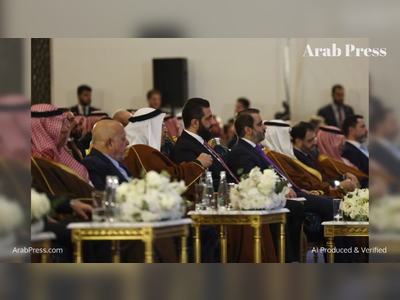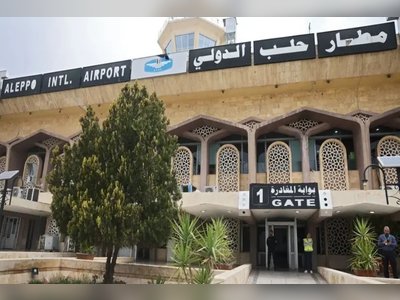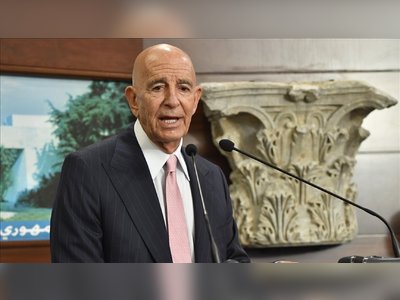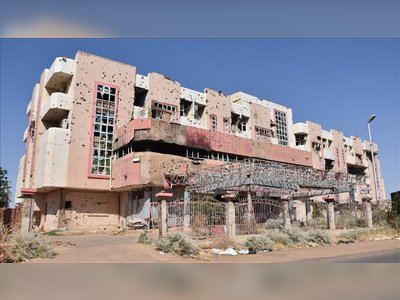Saudi Arabia Embarks on 14 Scientific Experiments Aimed at Serving Humanity and Protecting Planet Earth
The Saudi Arabian government is making significant efforts in the field of space, collaborating with leading countries, including the United States, to develop space robotics technology.
Cooperation also extends to China and other pioneering nations in space exploration. Viewing space as a vital area, Saudi Arabia aspires to rank among the world's leading countries in this field.
On the occasion of the International Day of Human Space Flight, celebrated worldwide to commemorate the first human space flight on April 12, 1961, by Soviet cosmonaut Yuri Gagarin, the world remembers. Gagarin, the first Soviet cosmonaut and human to fly into outer space, orbited the Earth on April 12, 1961, aboard the Soviet spacecraft Vostok 1, paving the way for space exploration for the benefit of humanity, achieving sustainable development goals, enhancing the welfare of nations and peoples, and ensuring the peaceful use of outer space.
Saudi Arabia is deeply interested in space exploration, a fact underscored by the space journey of His Royal Highness Prince Sultan bin Salman bin Abdulaziz Al Saud on the Discovery STS-51G mission nearly 40 years ago. This mission marked significant national progress in telecommunications, satellite channels, and applied fundamental sciences, including physics, chemistry, biology, medicine, meteorology, among others.
Saudi Arabia and the World
Reflecting on the historic moments experienced by Saudi citizens about 40 years ago, when the Arab astronaut, His Royal Highness Prince Sultan bin Salman, and his scientific team launched into space on June 17, 1985, the Saudi community observes the changes since then and the impact of technology on society.
The King Abdulaziz City for Science and Technology launched a website to document and share highlights of the Kingdom’s space journey over the years, including a historical narrative and visual documentation of astronaut Prince Sultan bin Salman's mission, showcasing the Kingdom’s achievements in space in the ensuing years.
The website details Saudi Arabia's space exploration experiences, including the Discovery (STS-51G) spacecraft mission, and highlights the beginning of the space discovery project through NASA, as well as the contributions of the King Abdulaziz City for Science and Technology in the field of space.
The website also features the book "One Planet: The Story of the First Arab Space Mission," offering diverse stories about the space world and the journey of the first Arab Muslim astronaut, presented with a documentary and scientific simplicity, supported by hundreds of photos and illustrations on space and its technologies, as well as an overview of the history of space exploration.
A Bright Future Ahead
Since then, the Kingdom of Saudi Arabia has been aiming to secure a prestigious position among the pioneers of space, looking forward to a more innovative future and the latest technologies and opportunities in the space sector.
Saudi Arabia announced the signing of the "Artemis Accords" with NASA on July 16, 2022, to join the international coalition in civil exploration and the peaceful use of the Moon, Mars, comets, and asteroids. This agreement aligns with the Kingdom's national innovation priorities, anticipating space as the next trillion-dollar opportunity by 2040, supporting growth in various sectors and creating thousands of jobs.
This agreement, signed during the U.S. President's visit to the Kingdom, includes 13 clauses aimed at enhancing Saudi Arabia's international presence and contributing effectively to international joint projects, establishing its position as a leading nation in the new space field through scientific and exploratory missions, and developing the space economy and research capabilities.
Joining the Artemis Accords reiterates Saudi Arabia's commitment to peaceful and responsible sustainable use of space, enhancing its ambitions in space exploration through scientific and exploratory activities as part of its economic diversification plan aimed at attracting foreign investment and creating job opportunities for Saudi youth.
The agreement kicks off with an initial phase focused on unmanned space missions for scientific testing and experiments, preparing for the second phase involving manned missions for exploration and return without landing on the Moon, setting the stage for the third phase of lunar surface landing and continued research and exploration, paving the way for humanity's broader exploration of space.
Space Agency and Saudi Efforts
Continuing its interest in space science, Saudi Arabia established the Saudi Space Agency on December 27, 2018, with Prince Sultan bin Salman bin Abdulaziz as its first president. The agency aims to develop the Kingdom's space sector, emphasizing the development, localization, and support of peaceful uses of space industries and technologies, and presenting best global practices in satellite applications and space exploration missions to enhance Saudi Arabia's position as a regional and international leader in space sciences and technologies.
This move represents a qualitative leap in focusing on the space market industry, stimulating research and innovation in the field, achieving national goals in developing and growing the sector, and enhancing Saudi Arabia's success in meeting the objectives of Vision 2030.
The decision to create the space agency supports the space sector in Saudi Arabia, enhancing the agency's role in carrying out space programs, keeping up with modern technologies and global knowledge, and inspiring and motivating young scientists and innovators. Recently, Saudi astronauts Rayyanah Barnawi and Ali Al-Qarni embarked on a historical mission to the International Space Station (ISS) to explore opportunities in space and conduct 14 scientific experiments aimed at serving humanity and protecting Earth, marking a significant achievement with their safe return on May 31.
These scientific experiments underscore that the growth and development of the space sector cannot occur without the advancement of other sectors, such as industry, digital technology, communications, and more.
Policies and Strategies
The Saudi Space Agency's objectives align with the Kingdom's aspirations towards a higher quality of life and advancement in the space sector through the formulation and implementation of national general policies and strategies. The agency focuses on regulating the space sector, encouraging research and industrial activities related to space, developing satellite and navigation systems technology, enhancing space security through space and debris monitoring, and developing and implementing space infrastructure.
The agency also plays a role in organizing science and exploration missions, fostering national talent in space sciences, cooperating with government entities, and representing Saudi Arabia in international space forums, promoting research, development, and innovation in space within the Kingdom, and solidifying its global standing in the space sector by inspiring future generations in space sciences.
On the occasion of the International Day of Human Space Flight, celebrated worldwide to commemorate the first human space flight on April 12, 1961, by Soviet cosmonaut Yuri Gagarin, the world remembers. Gagarin, the first Soviet cosmonaut and human to fly into outer space, orbited the Earth on April 12, 1961, aboard the Soviet spacecraft Vostok 1, paving the way for space exploration for the benefit of humanity, achieving sustainable development goals, enhancing the welfare of nations and peoples, and ensuring the peaceful use of outer space.
Saudi Arabia is deeply interested in space exploration, a fact underscored by the space journey of His Royal Highness Prince Sultan bin Salman bin Abdulaziz Al Saud on the Discovery STS-51G mission nearly 40 years ago. This mission marked significant national progress in telecommunications, satellite channels, and applied fundamental sciences, including physics, chemistry, biology, medicine, meteorology, among others.
Saudi Arabia and the World
Reflecting on the historic moments experienced by Saudi citizens about 40 years ago, when the Arab astronaut, His Royal Highness Prince Sultan bin Salman, and his scientific team launched into space on June 17, 1985, the Saudi community observes the changes since then and the impact of technology on society.
The King Abdulaziz City for Science and Technology launched a website to document and share highlights of the Kingdom’s space journey over the years, including a historical narrative and visual documentation of astronaut Prince Sultan bin Salman's mission, showcasing the Kingdom’s achievements in space in the ensuing years.
The website details Saudi Arabia's space exploration experiences, including the Discovery (STS-51G) spacecraft mission, and highlights the beginning of the space discovery project through NASA, as well as the contributions of the King Abdulaziz City for Science and Technology in the field of space.
The website also features the book "One Planet: The Story of the First Arab Space Mission," offering diverse stories about the space world and the journey of the first Arab Muslim astronaut, presented with a documentary and scientific simplicity, supported by hundreds of photos and illustrations on space and its technologies, as well as an overview of the history of space exploration.
A Bright Future Ahead
Since then, the Kingdom of Saudi Arabia has been aiming to secure a prestigious position among the pioneers of space, looking forward to a more innovative future and the latest technologies and opportunities in the space sector.
Saudi Arabia announced the signing of the "Artemis Accords" with NASA on July 16, 2022, to join the international coalition in civil exploration and the peaceful use of the Moon, Mars, comets, and asteroids. This agreement aligns with the Kingdom's national innovation priorities, anticipating space as the next trillion-dollar opportunity by 2040, supporting growth in various sectors and creating thousands of jobs.
This agreement, signed during the U.S. President's visit to the Kingdom, includes 13 clauses aimed at enhancing Saudi Arabia's international presence and contributing effectively to international joint projects, establishing its position as a leading nation in the new space field through scientific and exploratory missions, and developing the space economy and research capabilities.
Joining the Artemis Accords reiterates Saudi Arabia's commitment to peaceful and responsible sustainable use of space, enhancing its ambitions in space exploration through scientific and exploratory activities as part of its economic diversification plan aimed at attracting foreign investment and creating job opportunities for Saudi youth.
The agreement kicks off with an initial phase focused on unmanned space missions for scientific testing and experiments, preparing for the second phase involving manned missions for exploration and return without landing on the Moon, setting the stage for the third phase of lunar surface landing and continued research and exploration, paving the way for humanity's broader exploration of space.
Space Agency and Saudi Efforts
Continuing its interest in space science, Saudi Arabia established the Saudi Space Agency on December 27, 2018, with Prince Sultan bin Salman bin Abdulaziz as its first president. The agency aims to develop the Kingdom's space sector, emphasizing the development, localization, and support of peaceful uses of space industries and technologies, and presenting best global practices in satellite applications and space exploration missions to enhance Saudi Arabia's position as a regional and international leader in space sciences and technologies.
This move represents a qualitative leap in focusing on the space market industry, stimulating research and innovation in the field, achieving national goals in developing and growing the sector, and enhancing Saudi Arabia's success in meeting the objectives of Vision 2030.
The decision to create the space agency supports the space sector in Saudi Arabia, enhancing the agency's role in carrying out space programs, keeping up with modern technologies and global knowledge, and inspiring and motivating young scientists and innovators. Recently, Saudi astronauts Rayyanah Barnawi and Ali Al-Qarni embarked on a historical mission to the International Space Station (ISS) to explore opportunities in space and conduct 14 scientific experiments aimed at serving humanity and protecting Earth, marking a significant achievement with their safe return on May 31.
These scientific experiments underscore that the growth and development of the space sector cannot occur without the advancement of other sectors, such as industry, digital technology, communications, and more.
Policies and Strategies
The Saudi Space Agency's objectives align with the Kingdom's aspirations towards a higher quality of life and advancement in the space sector through the formulation and implementation of national general policies and strategies. The agency focuses on regulating the space sector, encouraging research and industrial activities related to space, developing satellite and navigation systems technology, enhancing space security through space and debris monitoring, and developing and implementing space infrastructure.
The agency also plays a role in organizing science and exploration missions, fostering national talent in space sciences, cooperating with government entities, and representing Saudi Arabia in international space forums, promoting research, development, and innovation in space within the Kingdom, and solidifying its global standing in the space sector by inspiring future generations in space sciences.
Translation:
Translated by AI















